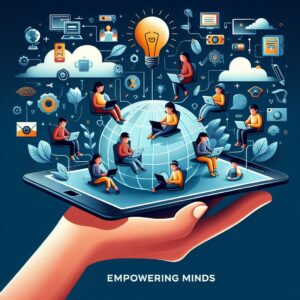Introduction: Empowering Minds
In the rapidly evolving landscape of the 21st century, digital literacy has become a fundamental skill for students, essential for navigating the modern world. Recognizing this, schools worldwide are embracing digital literacy initiatives to equip students with the necessary skills and knowledge. In this article, we explore the importance of digital literacy and the initiatives schools are implementing to foster this critical competency among students.
Understanding Digital Literacy: Navigating the Digital Landscape:
Digital literacy extends beyond the basic ability to use digital tools; it encompasses the skills to critically navigate, evaluate, and create content in the digital world. Understanding the nuances of online communication, discerning reliable sources, and having proficiency in digital tools are integral components of digital literacy.
Early Introduction to Technology: From Basics to Coding:
Digital literacy initiatives often start at an early age, introducing students to the basics of technology. This includes familiarizing them with hardware, software, and responsible internet use. As students progress, coding and programming are integrated into the curriculum, promoting problem-solving skills and computational thinking.
Internet Safety and Cybersecurity Education: Nurturing Responsible Netizens:
Educating students on internet safety and cybersecurity is a crucial aspect of digital literacy initiatives. Lessons on recognizing online threats, protecting personal information, and understanding the consequences of online behavior contribute to the development of responsible digital citizens.
Media Literacy: Critical Evaluation of Information:
In the era of information overload, media literacy is a key component of digital literacy initiatives. Students learn to critically evaluate information, discern biased sources, and understand the impact of media on perceptions. These skills empower students to navigate a world saturated with information effectively.
Project-Based Learning with Technology: Real-World Applications:
Digital literacy is reinforced through project-based learning that incorporates technology. Students engage in real-world applications of digital tools, fostering creativity and problem-solving skills. This hands-on approach allows them to apply their digital literacy skills in practical scenarios.
Collaborative Online Platforms: Enhancing Communication Skills:
Digital literacy initiatives leverage collaborative online platforms to enhance communication and teamwork skills. Students learn to collaborate on projects, share ideas, and provide constructive feedback through platforms that simulate real-world online work environments Empowering Minds.
Professional Development for Educators: Staying Ahead in Tech Trends:
To effectively impart digital literacy skills, educators undergo continuous professional development. Training programs keep teachers updated on the latest tech trends, teaching methodologies, and digital tools. Well-equipped educators are better positioned to guide students in their Empowering Minds digital literacy journey.
Parental Engagement Programs: Bridging the Digital Gap:
Recognizing the importance of a collaborative approach, schools include parental engagement programs in digital literacy initiatives. Workshops and resources are provided to parents, enabling them to support and reinforce digital literacy skills at home, creating a cohesive learning environment.
Conclusion: Empowering Minds
Digital literacy initiatives in schools are pivotal in preparing students for the challenges and opportunities presented by the digital age. By instilling foundational skills, promoting critical thinking, and fostering responsible digital citizenship, these initiatives empower students to navigate, contribute to, and thrive in an increasingly digital world. As schools continue to adapt and expand their digital literacy programs, they play a crucial role in shaping a future generation that is not just technologically proficient but also ethically and critically aware in the digital landscape.
For more Article like this, visit our Website Here

